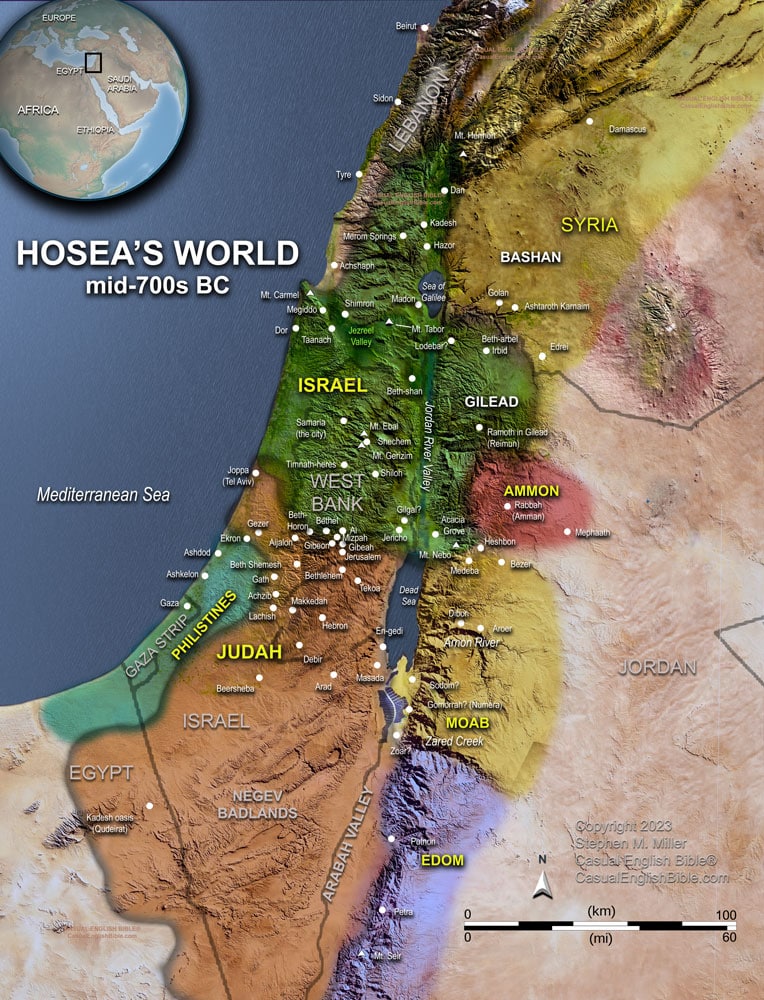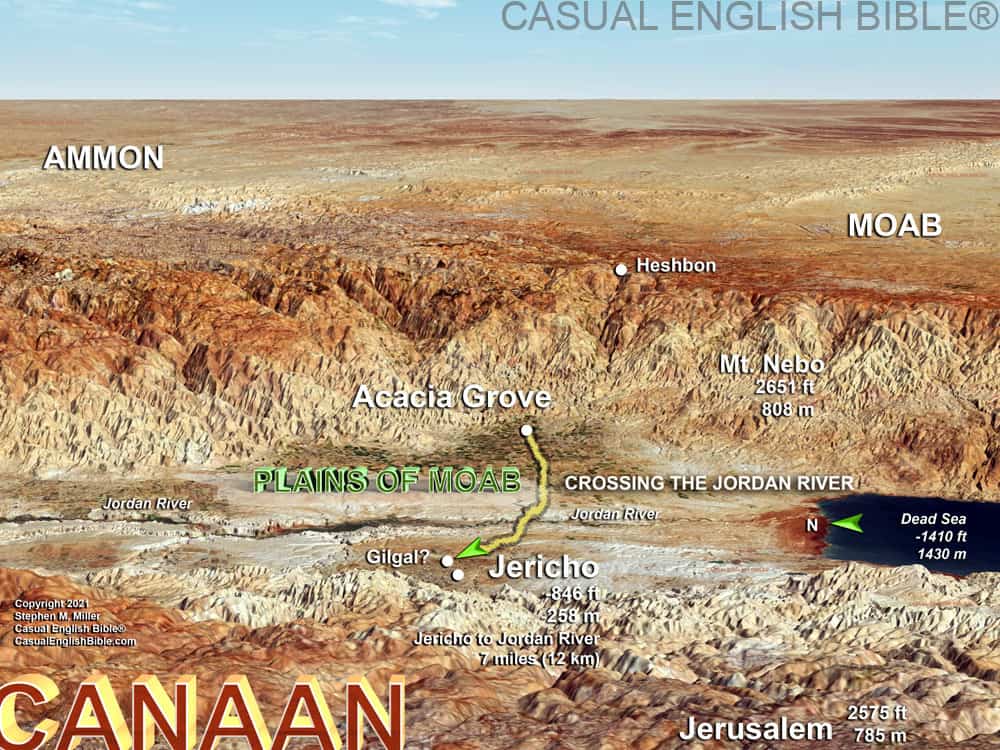Hosea 5
Tragedy ahead for Israel, Judah
Leaders exploit people they serve
1Listen to me, you priests of Israel.You too, leaders of the nation.
Listen, king and royal family.
I’m passing judgment on all of you.
You set a trap for my people at Mizpah. [1]
You threw a net over them at Tabor.
2You dug a pit to catch them at Acacia Grove. [2]
I’ll deal with you for what you’ve done.
3I see what Ephraim [3] is doing.
Israel isn’t getting by with anything.
Ephraim, you’re prostituting yourself.
Israel is ritually unclean and unfit to worship. [4]
4Their actions show this much:
They’re not coming back to God.
Infidelity has taken control of them.
God is a stranger to them now.
5Israel’s pride is proof of her sin.
Ephraim stumbles over the weight of his sin.
Judah will stumble along with him.
When God decided not to answer
6There’s coming a day when they’ll go to God,Offering sacrifices and asking for help.
They won’t get any.
The LORD has left them.
7They betrayed the LORD.
Instead of giving birth to his children
They gave birth to bastard children.
Well, there’s a new day [5] coming
When they’ll lose their land.
War
8It’s war! [6] Blow the horn in Gibeah.Blow the trumpet in Ramah.
Sound the alarm in Beth-aven. [7]
They’re coming for you, Benjamin. [8]
9Ephraim will get hit next and destroyed.
It’s judgment day for Israel.
10Leaders in Judah are thieves,
Like landgrabbers
Moving someone else’s boundary markers.
I’ve got a big bucket of wrath
And I’ll pour it all over them.
11Ephraim will end up tormented, stomped, and crushed.
That’s what they get for taking the wrong path
On a wild goose chase. [9]
Israel and Judah ooze and rot
12I’ll cover Ephraim with oozing sores.I’ll rot the flesh off Judah’s bones.
13Ephraim finally realized he was sick.
And Judah saw his own wound.
Ephraim asked the king of Assyria for help.
He sent ambassadors with the request.
Too bad, Assyria’s king can’t heal what you caught.
14I’m going to attack Ephraim
Like a lion in the wild.
And I’ll strike Judah
Like a powerful young lion.
I’ll rip them up and drag them off.
No one will come to save them.
15I’ll go back to where I came from.
Then I’ll stay until they call me
And admit what they did wrong.
By then, they’ll be in trouble
And they’ll beg for me to help them.
Footnotes
It’s a mystery why Hosea chose the three cities of Mizpah, Tabor, and Acacia Grove. It’s a fair guess that there’s some kind of wordplay going on, possibly with phonetic parallels. “Trap” is pah in Hebrew. And there’s a pah in “Mizpah.” But that seems a stretch, when comparing the Hebrew words. Some say Hosea picked the cities for their randomness.
The name in Hebrew is Shittim, which church folks wouldn’t want to read out loud in a worship service. It literally means “field of acacia trees,” or an acacia grove. Hence, “Acacia Grove.” You’re welcome.
“Ephraim” is another name for the Northern Jewish nation of Israel. It was the dominate tribe. The first northern king came from Ephraim. It’s a tribe located at the center of what had been the united nation of Israel, before the split. Ephraim’s southern border was just half a day’s walk north of Jerusalem.
Jews were considered ritually unclean after having sex. They had to take a bath and wait until evening before they were ritually clean (Leviticus 15; Exodus 19:15). Only then could they go to the Jerusalem Temple and worship God.
Literally, “the new moon.” It’s unclear what that means. Some interpret it as “the new people,” possibly a reference to the Assyrian invaders who would conquer Israel and annex the land as a province. Some interpret the “new moon” as a reference to worshiping gods of other religions.
Some scholars say this refers to a war between Judah in the south and Israel in the north. The conflict became known as the Syro-Ephraimite War (736-733 BC). Israel and allies including Syria, called Aram at the time, wanted to rebel against Assyria’s bullying. Assyria required smaller kingdoms to pay them. It’s like a bully stealing your lunch money or a mobster collecting from local businesses who don’t want to get beat up or killed. Israel wanted Judah to join the revolt. Judah didn’t want to risk a war with Assyria. So, they said no. Judah and Syria wouldn’t take no for an answer. They went to war with Judah, to force them into the rebellion for freedom. Irony. So, Judah asked Assyria for help. Some historians might say it’s generally not a good idea for the little guys to ask for help from the big guys because afterward, the big guys come to collect. Assyria defeated Israel, Syria, and the Philistines. Then Assyrian King Tiglath-Pileser III went to Jerusalem to clean out the Temple treasury. While in the area, he built pagan shrines.
Beth-aven was a sarcastic, slap in the face nickname for Bethel. A little like Filthadelphia for Philadelphia or Liverpuddle for Liverpool. “Bethel” translates as beth = house, and el = god. House of God. “Beth-aven” is the opposite of the joy that comes with having God in the house. It means House of Trouble. Bethel was the main worship center in Israel (1 Kings 12:28-30).
Gibeah, Ramah, and Beth-aven (with is another name for Bethel) were all located close together in the tribe of Benjamin’s territory. Border towns, they bounced back and forth between Israel in the north and Judah in the south, depending on who won the latest border war. This verse may describe Judah attacking Benjamin along the mountain route that ran from Jerusalem through those towns and then on into Ephraim’s territory deep into Israel.
This phrase is a guess based on context. What’s going on in the verse is that Israel is chasing something. Scholarly guesses include: vanity, idols, enemies, or their ally Syria (Aram). Whatever they’re chasing, they shouldn’t be chasing. For their trouble, they’ll end up with nothing but loss and grief. It’s a wild goose chase in the land of no geese.
Discussion Questions
- Sorry, there are currently no questions for this chapter.









